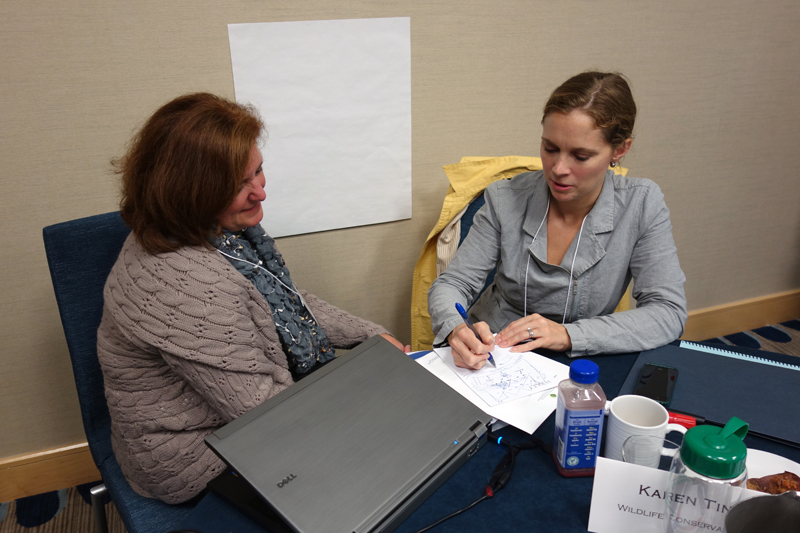On October 10 and 11, 2013, the second cohort of SENCER-ISE Partnerships met in Jersey City, NJ for an orientation meeting. David Burns, NCSCE Executive Director and SENCER-ISE Principal Investigator, opened the meeting by welcoming the new partners to the NCSCE community and speaking on the importance of the SENCER-ISE project.
Mr. Burns remarked, “we have embarked on a very exciting opportunity to think about whether compelling civic questions can become better organizing principles for informal science education institutions to turn into places that are, as Ann Bowers [co-founding trustee and chair of the Noyce Board of Trustees] says, ‘not just nice, but necessary.'” He went on to say, “This is also an opportunity to somehow connect, a little bit more robustly, higher education with informal science education institutions.”
Randi Korn and Stephanie Downey, of Randi Korn & Associates, Inc., led the partners in a workshop on developing outcomes and indicators for their respective projects. Not only did the workshop give the partners an opportunity to receive one-on-one guidance from Ms. Korn and Ms. Downey, but it also allowed for cross-partnership connections to be explored. Amy Tuininga of Fordham University, which is a partner with the Wildlife Conservation Society, reached out to the Connecticut Science Center and Connecticut University partnership to discuss sharing evaluation results.
 Dr. Tuininga said, “I really like the evaluation [plan] you are developing. We have similar components in our projects, but different foci.” Dr. Tuininga proposed sharing evaluation findings between the partnerships in order to benefit both projects. “I think we could learn a lot from each other,” Dr. Tuininga added.
Dr. Tuininga said, “I really like the evaluation [plan] you are developing. We have similar components in our projects, but different foci.” Dr. Tuininga proposed sharing evaluation findings between the partnerships in order to benefit both projects. “I think we could learn a lot from each other,” Dr. Tuininga added.
The second day of the meeting focused on action planning and addressing possible obstacles that the partnerships might face in the future. Jonathan Bucki, of the Dendros Group, facilitated the workshop, which allowed the partners to further develop their project plans. The partners were encouraged to consider institutional differences- misaligned schedules, for instance- when working on their action plans.
The SENCER-ISE project is not only about supporting and creating a network of resources for these individual partnerships; it is also about learning what makes partnerships of this kind work, and what sort of impact they can have on the educational system.
The staff and partners at the meeting discussed ways in which SENCER-ISE could do this. Hank Gruner, of the Connecticut Science Center, shared with the group how the meeting’s activities brought systemic challenges back into the forefront of thought for him and for and his partner, Rachel O’Neill, of the University of Connecticut. Mr. Gruner explained that they began thinking, “how do we push our organizations to see that this can’t just be project-based? There needs to start to be a discussion among our institutions at another level.” He went on to add, “we need to start to really look at if can we shift this a little bit to get a bigger buy-in on an initiative that starts to push at a more sustainable effort in connecting researchers with informal science educators, and ultimately with the public.”
While concluding the meeting, Ellen Mappen, SENCER-ISE Project Coordinator, reaffirmed the thoughts of Mr. Gruner and others. Dr. Mappen reflected that, “these projects…will help individual students and local communities.” Dr. Mappen then went on to ask, “How do we make these types of projects an acceptable part of what higher education institutions do, so that learning how best to communicate science is seen as an integral part of a graduate student’s education and not just an add-on? These are important questions for the SENCER-ISE project to answer.”
The second cohort partners have been invited to join the SENCER-ISE staff and Cohort 1 partners on our first video meeting on November 5, 2013. During the meeting, the second cohort will have the chance to meet the partners of the other six partnerships, learn about the progress of the first cohort’s projects, and have the opportunity to further discuss obstacles that the partnerships might face.
SENCER-ISE Co-PIs and Partner Institution Representatives taking part in the meeting include:
Cornell University and the Sciencenter
- Michelle Kortenaar, Sciencenter
- Tamar Kushnir, Cornell University
- Mariel Schneider, Cornell Univeristy
Fordham University and the Wildlife Conservation Society
- Debbie Dieneman-Keim, Wildlife Conservation Society
- Karen Tingley, Wildlife Conservation Society
- Amy Tuininga, Fordham University
Hamilton College and the Green Science Policy Institute
- Arlene Blum, Green Science Policy Institute
- Timothy Elgren, Hamilton College
- Avery Lindeman, Green Science Policy Institute
University of Connecticut and the Connecticut Science Center
- Hank Gruner, the Connecticut Science Center
- Rachel O’Neill, University of Connecticut
To learn more about the SENCER-ISE project and all ten partnerships, visit the project’s website, found here or the NCSCE initiative page, found here.
Written by Hailey Chenevert, NCSCE
[email protected]
